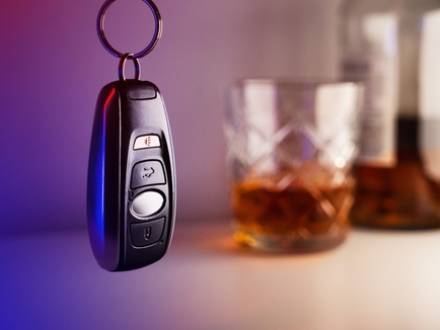Recent Blog Posts
What Happens if I Get a Second DUI in Illinois?
 A first DUI can be written off as a simple lapse in judgment or a youthful mistake. The consequences, while painful, are usually not too harsh. Getting a second DUI is a much more serious matter. After a second arrest for driving drunk or high, you are probably going to be almost automatically deemed an alcoholic or addict. The court might start to think that letting you drive might be a risk to the public’s safety. If you avoided jail time the first time, you may not be so lucky the second time. However, you have the same opportunity to defeat the charge that you did the first time. Involving an experienced Grundy County, IL repeat DUI lawyer right away is best way to protect your rights.
A first DUI can be written off as a simple lapse in judgment or a youthful mistake. The consequences, while painful, are usually not too harsh. Getting a second DUI is a much more serious matter. After a second arrest for driving drunk or high, you are probably going to be almost automatically deemed an alcoholic or addict. The court might start to think that letting you drive might be a risk to the public’s safety. If you avoided jail time the first time, you may not be so lucky the second time. However, you have the same opportunity to defeat the charge that you did the first time. Involving an experienced Grundy County, IL repeat DUI lawyer right away is best way to protect your rights.
Consequences of a Second DUI
The consequences of a second DUI in Illinois include:
Can I Be Charged for a Fight I Did Not Start?
 Some people truly are out looking for a fight. Having a run-in with one of them can turn a fun night out into a disaster. Even if you made a good effort to defuse the situation before it escalated into violence, you might still have found yourself caught up in a bar brawl you had no desire to be in. If there were numerous people involved in the brawl, you may not even know what started the fight. While you may have tried to avoid getting in a fight, there is still a chance you could be arrested and charged with assault or battery. An experienced Joliet, IL criminal defense lawyer can help you fight back against unfair charges.
Some people truly are out looking for a fight. Having a run-in with one of them can turn a fun night out into a disaster. Even if you made a good effort to defuse the situation before it escalated into violence, you might still have found yourself caught up in a bar brawl you had no desire to be in. If there were numerous people involved in the brawl, you may not even know what started the fight. While you may have tried to avoid getting in a fight, there is still a chance you could be arrested and charged with assault or battery. An experienced Joliet, IL criminal defense lawyer can help you fight back against unfair charges.
Possible Defenses After Being Arrested for Fighting
If you did not throw the first punch or otherwise start the violence, you may have a good argument for self-defense. If you were attacked first and reasonably believed that you needed to use force to protect yourself or someone else, you had the legal right to do so. However, you cannot prevail on a self-defense claim if you used excessive force beyond what was necessary to stop your opponent from hurting you.
The Cost of Not Driving After a DUI
 A lot of people find that the worst part of being charged with a DUI is not being able to drive for a year or more. When you lose your driving privileges, you lose your independence. While nearby Chicago has an excellent public transportation system, making it possible to get anywhere in the city without a car, the same cannot be said for more suburban Will County. Even if you work in the city, getting close enough to its borders to catch a train may be a struggle. Fortunately, there are steps a Joliet, IL criminal defense lawyer can take to help you get your license reinstated or to gain temporary restricted driving privileges.
A lot of people find that the worst part of being charged with a DUI is not being able to drive for a year or more. When you lose your driving privileges, you lose your independence. While nearby Chicago has an excellent public transportation system, making it possible to get anywhere in the city without a car, the same cannot be said for more suburban Will County. Even if you work in the city, getting close enough to its borders to catch a train may be a struggle. Fortunately, there are steps a Joliet, IL criminal defense lawyer can take to help you get your license reinstated or to gain temporary restricted driving privileges.
How a DUI License Suspension Can Impact Your Life
Losing your license, even temporarily, can affect you financially, socially, and in terms of your career or education. A few ways this loss of license might impact your life include:
What Happens if an Out-of-State Student Gets Arrested in Illinois?
 Young people often leave their home state to attend college elsewhere. Students may come to Illinois because one of our universities offers the particular major they are interested in, is a leader in their field of study, or because they have been awarded a scholarship. Others come because they have family in the area they can stay with to reduce housing costs or because they grew up here and are comfortable in the area. Unfortunately, college students are often arrested for alcohol-related crimes, like DUI, underage drinking, and bar fights. If you are an out-of-state resident and have been arrested in Illinois, a Grundy County, IL criminal defense lawyer can help you.
Young people often leave their home state to attend college elsewhere. Students may come to Illinois because one of our universities offers the particular major they are interested in, is a leader in their field of study, or because they have been awarded a scholarship. Others come because they have family in the area they can stay with to reduce housing costs or because they grew up here and are comfortable in the area. Unfortunately, college students are often arrested for alcohol-related crimes, like DUI, underage drinking, and bar fights. If you are an out-of-state resident and have been arrested in Illinois, a Grundy County, IL criminal defense lawyer can help you.
You Will Need to Stay in Illinois to Respond to Charges
Being arrested can come as a shock to a college student. You might be tempted to simply return to your home state and never set foot in Illinois again. However, this would likely lead to another arrest, and you would be sent back to Illinois anyway.
Understanding Child Endangerment Charges in Illinois
 Child endangerment is a serious crime that can have long-lasting consequences. In Illinois, understanding the legal complexities of this charge is crucial for anyone facing allegations or charges. If you are facing charges related to child endangerment, you need to act swiftly to ensure your rights and freedoms are protected. Contact an experienced criminal defense attorney to ensure you understand the potential defenses available to build as robust a defense as possible.
Child endangerment is a serious crime that can have long-lasting consequences. In Illinois, understanding the legal complexities of this charge is crucial for anyone facing allegations or charges. If you are facing charges related to child endangerment, you need to act swiftly to ensure your rights and freedoms are protected. Contact an experienced criminal defense attorney to ensure you understand the potential defenses available to build as robust a defense as possible.
Definition of Child Endangerment in Illinois
Illinois defines child endangerment as actions or omissions that put a child’s health or safety at risk. This broad definition encompasses various situations that can be interpreted differently based on the context, making it a complex area for legal defense. Here is how certain elements of child endangerment are defined:
5 Tips to Make the Most Out of Your Pretrial Hearing | IL
 Facing a criminal defense hearing can be daunting. However, with preparation, you can improve your chances of a favorable outcome. Here are five essential tips to help you through your pretrial hearing and increase your chance of a successful outcome. Contact an Illinois criminal defense lawyer for more help with your case.
Facing a criminal defense hearing can be daunting. However, with preparation, you can improve your chances of a favorable outcome. Here are five essential tips to help you through your pretrial hearing and increase your chance of a successful outcome. Contact an Illinois criminal defense lawyer for more help with your case.
Understand Your Criminal Defense Charges
Before your hearing, make sure you fully grasp the charges against you. This knowledge is crucial for several reasons:
-
You need to understand the options you have, including plea deals and going to trial
-
You need to understand your attorney’s strategy for fighting the charges
-
You need to understand the potential consequences of the charges you are facing
How Juvenile Record Expungement is Changing Lives in Illinois
 Illinois has taken a significant step forward in juvenile justice reform. A new law, set to take effect on January 1, 2025, will automatically start the expungement timeline for juvenile offenders upon their release from detention. This change aims to help young people move past their mistakes and build better futures.
Illinois has taken a significant step forward in juvenile justice reform. A new law, set to take effect on January 1, 2025, will automatically start the expungement timeline for juvenile offenders upon their release from detention. This change aims to help young people move past their mistakes and build better futures.
The law amends the Juvenile Court Act, requiring state courts to clear the records of individuals charged as juveniles two years after completing their sentence. An Illinois lawyer can help you understand this new law better and determine how it can benefit you.
Important Changes and Benefits
The expungement process begins immediately upon release from detention. Courts will automatically set up expungement hearings, eliminating the need for individuals to navigate complex legal procedures. Two years after sentence completion, the system will clear records, providing a quicker path to a clean slate.
What to Expect After You Receive a Charge for Distributing Cocaine
 Being charged with distributing cocaine is a serious matter that can have life-altering consequences. An Illinois lawyer can help you understand the legal process and potential outcomes. It is helpful to understand what you may expect after receiving such a charge.
Being charged with distributing cocaine is a serious matter that can have life-altering consequences. An Illinois lawyer can help you understand the legal process and potential outcomes. It is helpful to understand what you may expect after receiving such a charge.
The Legal Process
-
Arrest and Booking: Following your arrest, you will be taken to a police station for booking. This process includes fingerprinting, photographs, and recording of personal information.
-
Initial Hearing: Within 48 hours of arrest, you will appear before a judge for your initial hearing. The judge will inform you of the charges and your rights, and may set bail.
-
Formal Charges: The prosecutor will file formal charges, typically within 30 days of arrest. For cocaine distribution, charges are often filed as a Class X felony in Illinois.
Construction Zone Speed Limits in Illinois: What Every Driver Should Know
 Construction zones are a common sight on Illinois roads, especially during the summer months. Many drivers assume that reduced speed limits in these areas only apply when workers are present. However, this misconception can lead to serious legal consequences if you are caught speeding. An Illinois lawyer can help you understand the realities of construction zone speed enforcement.
Construction zones are a common sight on Illinois roads, especially during the summer months. Many drivers assume that reduced speed limits in these areas only apply when workers are present. However, this misconception can lead to serious legal consequences if you are caught speeding. An Illinois lawyer can help you understand the realities of construction zone speed enforcement.
The Law in Illinois
Illinois law is clear on driving through construction areas. According to the Illinois Vehicle Code, drivers must adhere to posted speed limits in construction zones at all times, regardless of whether workers are present. The statute explicitly states: "A person may not operate a motor vehicle in a construction or maintenance speed zone at a speed in excess of the posted speed limit when workers are not present."
Can You Get Out Of a Street Racing Charge in Illinois?
 Street racing is a serious offense in Illinois, carrying severe penalties that can significantly impact your life. If you have been charged with street racing, you might wonder if there are ways to fight the charge or mitigate the consequences. An Illinois lawyer can help you with the legalities surrounding street racing and potential strategies for defending against such charges.
Street racing is a serious offense in Illinois, carrying severe penalties that can significantly impact your life. If you have been charged with street racing, you might wonder if there are ways to fight the charge or mitigate the consequences. An Illinois lawyer can help you with the legalities surrounding street racing and potential strategies for defending against such charges.
First, Make Sure You Understand Street Racing Charges
Illinois law defines street racing in two ways:
-
Two or more vehicles driving side-by-side, accelerating in an attempt to outpace each other.
-
One or more vehicles racing on a predetermined route, timed from start to finish, competing based on speed or acceleration.
Penalties for street racing in Illinois are severe:
-
First offense: Class A misdemeanor leads to fines of up to $250.

















